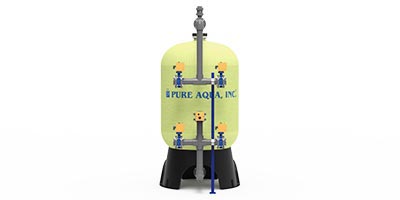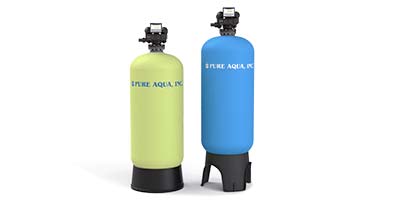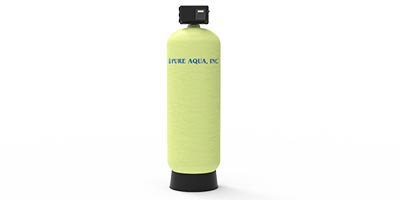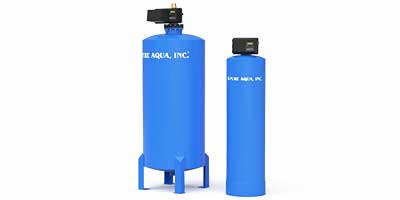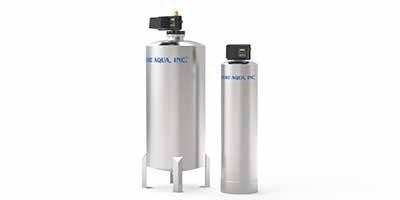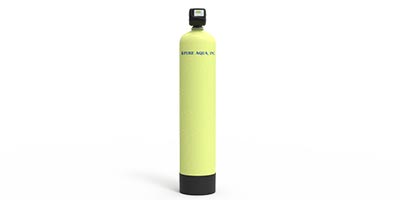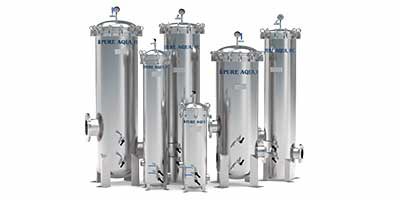Industrial & Commercial Water Filters
Whether your issue revolves around removing unwanted impurities from tap water, industrial plant processes, or commercial business, we have the efficient systems that you are looking for within our comprehensive selection of water filters. However, it is important to understand that one specific filter is not designed to remove every contaminant, so understanding which filters work best for your problem is most advisable.
Service Flow Rates:
11 to 770 GPM
(2.5 to 175 M³/hr)
- Epoxy Coated Carbon Steel Tanks
- Diaphragm or Butterfly Valves
- Digital Stager or PLC
Service Flow Rates:
11 to 770 GPM
(2.5 to 175 M³/hr)
- 304SS or 316SS Tank Construction
- Diaphragm or Butterfly Valves
- Digital Stager or PLC
Service Flow Rates:
19 to 806 GPM
(4.4 to 183 M³/hr)
- Fiberglass (FRP) Tanks
- Diaphragm or Butterfly Valves
- Digital Stager or PLC
Service Flow Rates:
1.9 to 117 GPM
(0.6 to 26.4 M³/hr)
- Fiberglass (FRP) Tanks
- Magnum Autotrol Valves
- Manual or Programmable Regeneration
Service Flow Rates:
1.9 to 125 GPM
(0.6 to 29 M³/hr)
- Fiberglass (FRP) Tanks
- Fleck Control Valves
- Manual or Programmable Regeneration
Service Flow Rates:
7.5 to 125 GPM
(1.7 to 29 M³/hr)
- Epoxy coated Carbon Steel Tanks
- Fleck Control Valves
- Manual or Programmable Regeneration
Service Flow Rates:
7.5 to 125 GPM
(1.7 to 29 M³/hr)
- 304SS or 316SS Tank Construction
- Fleck Control Valves
- Manual or Programmable Regeneration
Service Flow Rates:
1.9 to 250 GPM
(0.6 to 57 M³/hr)
- Fiberglass (FRP) Tanks
- Clack Control Valves
- Manual or Programmable Regeneration
Service Flow Rates:
6 to 3,000 GPM
(1 to 682 M³/hr)
- 304SS or 316SS Construction
- Flanged, MNPT or FNPT Connections
- Operating Pressure: 150 PSI
Service Flow Rates:
6 to 216 GPM
(1 to 50 M³/hr)
Service Flow Rates:
45 to 90 GPM
(10 to 20 M³/hr)
Pure Aqua has over 20 years of experience as a world-wide supplier of water filters and related products for applications that require top-quality water filtration. Pure Aqua's long history of distributing water filtration systems has enhanced our reputation as one of the most dependable water treatment company's in the world.
Pure Aqua manufactures industrial water filters in commercial, institutional, seawater, tap, brackish and industrial water sectors that remove the following:
- Sediments & turbidity
- Iron and manganese
- Unpleasant tastes
- Odors
- Suspended particles
- Unwanted color
- Chlorine
By using stainless steel, epoxy coated steel or FRP tanks (depending on the need), our industrial water filters can be used in a variety of applications including municipal, institutional and industrial water filtration applications, and in nearly any climate or weather condition.
With the utilization of the correct pressure tanks, valves and accurate filter media choices, Pure Aqua's industrial water filters can suit most any water filtration requirements.
Our equipment can be designed to operate manually, semi- or fully-automatically and requires very limited technical knowledge. Multi-media water filter system are a significant upgrade from single-media filters. This is primarily due to improved filter bed action based on the innovative use and selection of filter media. Multi-media filtration allows delivery of high quality filtered water at much faster flow rates, as compared to a conventional sand filter. In a conventional sand filter, lighter and finer sand particles are found at the top of the filter bed, and coarser, heavier sand particles remain at the bottom after backwashing. Filtration takes place in the top few inches of the filter bed.
A multi-media filter is backwashed in the same manner as a sand filter, using reverse or upward flow of water through the filter bed. The various layers of media retain their stratification because each material has a different density.
All Pure Aqua steel and stainless steel industrial water filters include pressure tanks constructed of high quality welded steel designed for 100 psi working pressure and tested for 150 psi. Standard pressure tanks are equipped with inlet and outlet connections, top mounted loading port (either handhole or manhole), and a side filter media removal fitting. Due to the corrosive nature of other filter media types, all carbon steel tanks are epoxy lined.
We design our filters using the correct pressure tanks, automatic or manually operated valves, filter media choice and operating conditions, our industrial water filtration solutions meet most water filtration requirements. The equipment operates in a manual using manual valves, semi- or fully-automatic using fully automated PLC or controller, and requires requiring very limited technical knowledge. Backwash initiation can be through a timer, external signal from a central control system or using a differential pressure switch.
| Our filters serve the following Industries: | ||
|
|
|
In addition to the conventional media filters, Pure Aqua has a wide range of Stainless Steel Cartridge Filter Housings. The SSC series is engineered and manufactured to handle harsh applications. We can offer different cartridge elements to meet your specifications.
Questions and Answers
What do commercial water filters remove?
Commercial water filters are filtration systems designed with microscopic holes that are tiny enough to prevent unwanted substances such as chemicals, minerals, sediments, particles, metals, and other impurities from going through along with the water. Commercial water treatment technology are a prerequisite for any industry that requires fresh, purified water on a consistent basis. As the manufacturing and design of commercial water filters continue to develop, the features and long-term usability of these systems for commercial applications also expand.
Since most water sources do not only contain simple H20, but a myriad of other substances which can be harmful to human health when exposed, there needs to be a filtration method to provide a solution for this problem. The amount of chemicals, metals, and total dissolved solids (TDS) lurking in specific water sources depends on many natural circumstances. Some regions/areas tend to contain higher degrees of salt and mineral levels compared to others.
How do you maintain your commercial water filters?
Consistent maintenance is required for your commercial water filters in order to ensure long-term use at ideal effective rates. The first step to maintaining your filter is to occasionally clean the inlet mesh screen to avid clogging and flow restrictions. The inlet filter is responsible for trapping large particles, debris, and sediments from entering the pump, including closing off the system for the purposes of averting leaks. Periodic replacements of your commercial water filters will be vital to its success in consistent filtration of suspended solids and sediments from the product water.
What types of water filters are available commercially?
Water filtration systems are classified into commercial water filters and industrial water filters. Both have their own unique features that are useful in different applications. These factors include:
Commercial water filters are structurally small and are energy-efficient due to needed very minimal amounts of power in order to operate. These filters fit perfectly in applications within commercial buildings such as restaurants, hotels, retail and office buildings, etc. The maintenance cost of these smaller commercial water filters is less than the expense that comes with industrial water filters.
Industrial water filters are larger filtration units that are designed to remove higher degrees of contaminants from water sources. Refineries, power plants, military, and other industries require the provision of these filters to produce greater quantities of purified water for use in complex industrial applications.
What are industrial water filters?
Industrial water filters are utilized to eradicate impurities from water in industrial applications. The pores in these water filters are small enough to allow water to seep through, but not suspended solids that contaminates the water. There are a variety of industrial water filters that are built for different usage, and can be used for different applications such as water pre-treatment for reverse osmosis systems, nanofiltration, ultraviolet sterilizers, ion exchange and ultrafiltration systems.
How industrial water filters work?
Industrial water filters work by removing particles from water or wastewater streams. While many kinds of industrial water filters can be used to remove suspended solids, only one of these filters is needed to produce filtered water. However, there are many instances where only a certain number and type of industrial water filter is suitable. Here are some aspects to consider when determining the right type of filter to use:
- The volume of impurities in the water
- Whether water needs continuous filtering or intermittent
- The scope of particle sizes
- The number of suspended solids in the water
- The number of suspended solids wanted after filtration
- The size of the particles sought in the water after filtration
How to choose the right industrial water filter?
Choosing the right high pure water filter depends on a variety of factors which must be considered in order to attain sufficient results. Such factors include, the maximum flow rate required, the average flow rate of the water, the nature of the suspended matter, the required quality of purified water, and the availability of an adequate supply of water for backwashing the filter are all basic parameters to be kept in mind.
Are industrial water filtration systems necessary?
Yes, industrial water filtration systems are an essential component in any industry that requires the utilization of fresh, clean water. Industries such as food & beverages, hospitals, power plants, and pharmaceuticals, can not afford to be left with only sub-par quality water due to the effects it will have on equipment and products. Serving customers beverages that were produced with low-quality water will be impossible to conceal and will harm the reputation of the business. Industrial water filtration systems are a guaranteed solution to providing water that has the necessary value in terms of safety, taste, and sanitation, all of which are expected by consumers.
The process of industrial water filtration systems is effective in removing a myriad of contaminants that harm the quality of water, such as lead, heavy metals, particles, bacteria, viruses, chlorine, and its byproducts. This filtration helps in avoiding unwanted diseases or other health risks from occurring when the polluted water is exposed to humans by way of consumption or through other means. As aforementioned, most equipment performance can result from the quality of water they require to use to operate, which has a direct consequence on the productiveness and output of the industrial plants.
For the reasons mentioned above, industrial water filtration systems are increasing in usage throughout industrial companies for their efficiency in saving time, energy, and costs. The need for maintaining or replacing under performing equipment, and the loss of business due to bad tasting food and beverages, including other unwanted effects can all be prevented with the utilization of industrial water filtration systems.
 ENGLISH arrow_drop_down
ENGLISH arrow_drop_down
 ESPAÑOL
ESPAÑOL ???????
??????? PORTUGUÉS
PORTUGUÉS FRANÇAIS
FRANÇAIS



